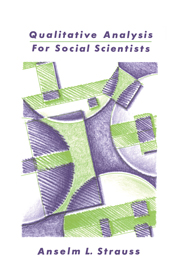Book contents
- Frontmatter
- Contents
- Preface
- 1 Introduction
- 2 Two illustrations
- 3 Codes and coding
- 4 Seminar on open coding
- 5 Memos and memo writing
- 6 Team meetings and graphic representations as memos
- 7 Excerpts that illustrate common problems
- 8 Integrative diagrams and integrative sessions
- 9 Integrative mechanisms: diagrams, memo sequences, writing
- 10 Presenting case materials: data and interpretations
- 11 Grounded formal theory: awareness contexts
- 12 Reading and writing research publications
- 13 Questions and answers
- 14 Research consultations and teaching: guidelines, strategies, and style
- Epilogue
- Appendix Discovering new theory from previous theory
- References
- Author index
- Subject index
3 - Codes and coding
Published online by Cambridge University Press: 26 January 2010
- Frontmatter
- Contents
- Preface
- 1 Introduction
- 2 Two illustrations
- 3 Codes and coding
- 4 Seminar on open coding
- 5 Memos and memo writing
- 6 Team meetings and graphic representations as memos
- 7 Excerpts that illustrate common problems
- 8 Integrative diagrams and integrative sessions
- 9 Integrative mechanisms: diagrams, memo sequences, writing
- 10 Presenting case materials: data and interpretations
- 11 Grounded formal theory: awareness contexts
- 12 Reading and writing research publications
- 13 Questions and answers
- 14 Research consultations and teaching: guidelines, strategies, and style
- Epilogue
- Appendix Discovering new theory from previous theory
- References
- Author index
- Subject index
Summary
Coding is the most difficult operation for inexperienced researchers to understand and to master, as noted earlier. Even when understood theoretically, the actual procedures are still baffling for some people, despite watching an instructor or some other experienced researcher do the coding. What is needed, apparently, are examples of coding steps, and visualizations of actual codes. Finally, considerable practice at coding is requisite. The materials in this chapter are designed to help that learning process.
But first recollect that coding: (1) both follows upon and leads to generative questions; (2) fractures the data, thus freeing the researcher from description and forcing interpretation to higher levels of abstraction; (3) is the pivotal operation for moving toward the discovery of a core category or categories; and so (4) moves toward ultimate integration of the entire analysis; as well as (5) yields the desired conceptual density (i.e., relationships among the codes and the development of each) (Glaser 1978, pp. 55–82).
To supplement that summary statement, readers should examine again the sections on codes and coding in Chapter 1, and this should be done before studying the materials given below. These consist of several illustrations. The first will illustrate getting off the ground with open coding, by presenting what a research seminar of beginning students did with a fragment of interview data. Next, there is an instance of open coding done with a section of a fieldnote, showing how the initial open coding is done step by step by an experienced analyst. This is followed by a discussion of axial coding illustrated by a set of coding notes done by the same analyst on the same fieldnote.
Information
- Type
- Chapter
- Information
- Qualitative Analysis for Social Scientists , pp. 55 - 81Publisher: Cambridge University PressPrint publication year: 1987
Accessibility standard: Unknown
Why this information is here
This section outlines the accessibility features of this content - including support for screen readers, full keyboard navigation and high-contrast display options. This may not be relevant for you.Accessibility Information
- 18
- Cited by
